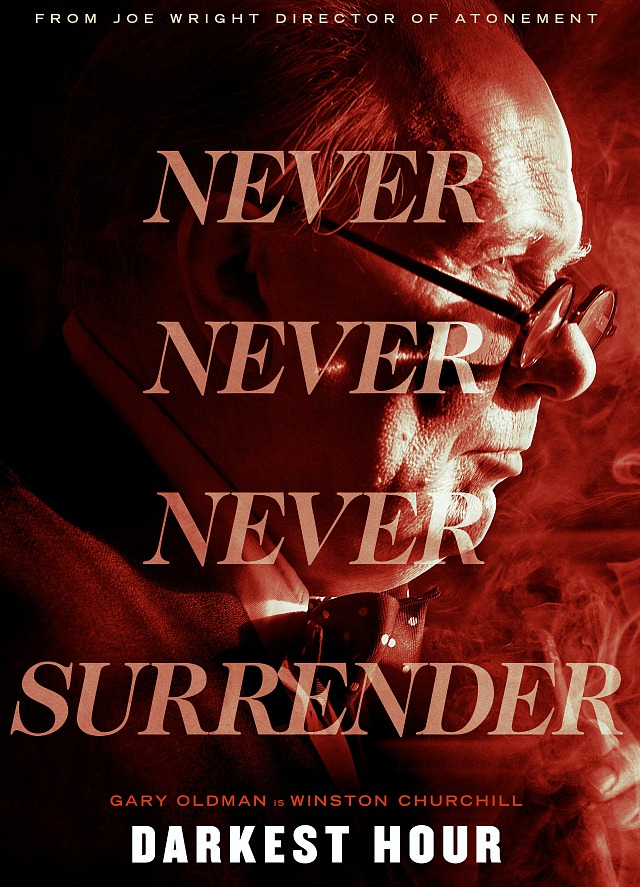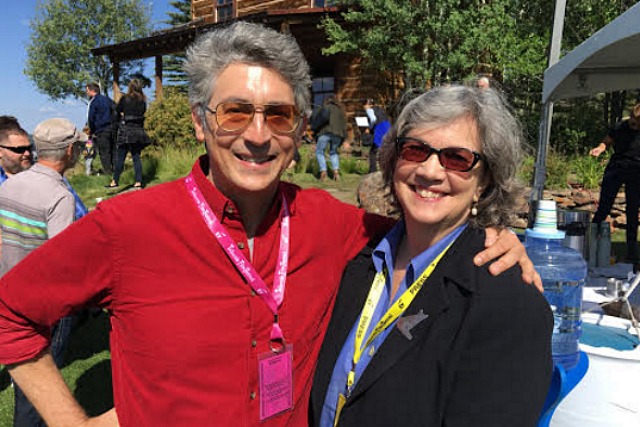I was in such an anxious, cranked-up state as I finished posting around 12:20 pm that I just grabbed my stuff and sped (i.e., speed-marched) over to the Palm for the 1 pm screening of Battle of the Sexes. What’s that? The 1 pm screening of Battle of the Sexes wasn’t at the Palm but the Galaxy, which is four blocks to the east? Yeah, I finally figured that out when Natalie Portman and two other guys took the stage just before the film began. “What does Portman have to do with Battle of the Sexes?” I was muttering to myself. I re-checked the program…fuck. I was at a 1:15 pm screening of Eating Animals. I leapt out of my seat and literally ran over to the Galaxy, but no dice. Battle of the Sexes had been playing for 20, 25 minutes, and every last seat was taken. Now I’ll have to catch it Sunday night. I do stuff like this from time to time. I’m trying to be relaxed about this bonehead move, but it’s not working.
Month: September 2017
Oldman, Wright Post-Screening Remarks
There’s nothing like a good Telluride deadline panic. It pushes you to the limit, makes you breathe and walk faster, cleans out the blood, cranks up the heartrate. Later…
Hyperventilating As I Tap Out Darkest Hour Thoughts
Joe Wright‘s Darkest Hour, which I haven’t time to write about because a 1 pm Battle of the Sexes screening is breathing down my beck, is partly a celebration of the fighting spirit of Winston Churchill (winningly played by Gary Oldman in a colorful, right-down-the -middle, straight-over-the-plate performance) and partly a political drama about the wavering discord and uncertainty that gripped the British leadership in the early days of Churchill’s first term as prime minister.
It’s basically the governmental deliberation side of Chris Nolan‘s Dunkirk, or the handling of that disaster and matters of backbone and patriotism and never-say-die in May and early June of 1940.
It feels familiar and well-trod (how could it not be given all the recent Churchill portrayals?) but rousingly straightforward. It’s a stirringly square, well-handled audience movie. The easily impressed were cheering and clucking when yesterday afternoon’s Palm screening ended.
Will Oldman’s flamboyantly twitchy performance result in a Best Actor nomination? You betcha, but honestly? He’s given the kind of classically actor-ish, heavily-made-up turn that could have been performed 30 or 50 or even 70 years ago. There will be no ignoring Oldman’s work here, but it’s not wedded to the present-day zeigeist. It’s a golden-oldie performance, albeit delivered fresh and new with plenty of zing and punch. Nothing wrong with that.
And that’s all I can write for now as I have to leave for the Galaxy theatre to get in line, etc. I’ll try to fill in later.

Downsizing Deflates, Treads Water in Telluride
As one who was nearly euphoric about that ten-minute clip from Alexander Payne‘s Downsizing that I saw five months ago at Cinemacon, it breaks my heart and drains my soul to report that this portion of Payne’s film is far and away the most engaging, and that the rest of it is…well, certainly original and fascinating and intriguing as far as it goes. But the film as a whole doesn’t score on a jackpot level.
Downsizing (Paramount, 12.22) came into Telluride like Leo the lion, fed by those high aggregate review scores out of the Venice Film Festival and those highly admiring reviews from Todd McCarthy and Owen Gleiberman, but things quickly turned quiet and gulpy after yesterday’s 2 pm screening at the Chuck Jones theatre.
Right now I would call Downsizing a respected lamb that no one I’ve spoken to, and I mean no one, is truly over-the-moon about. Except for Todd McCarthy, I mean. 1:05 pm update: An older woman I just spoke to in line called it “embarrassing.” That’s too harsh! What it does is under-deliver.
Everyone knows the boilerplate. A futuristic setting and a dazzling, astonishing scientific discovery from Norwegian scientists that allows humans to reduce themselves to five inches tall. In so doing small volunteers live much more luxuriously and lavishly (their financial holdings are worth much more) while hundreds of thousands if not millions of carbon footprints are sharply reduced, and a far healthier environment results. Or so it seems at first.
The story is about shlumpy physical therapist Paul Safranek (Matt Damon) and his shallow wife Audrey (Kristen Wiig) deciding to get small and live lavishly inside a downsized tiny town. A controlled environment inside a plastic dome, safe from birds and cats and other predators.
The truth is that Downsizing starts off like a house on fire (loving it! yes! so great! Christoph Waltz is a hoot!) and then it starts to droop around the 40-minute mark, and then it really droops and sags when the movie moves to Norway. (No, I’m not going to explain what means, just that the film goes there during the final act. Read the McCarthy and Gleiberman reviews if you want specifics.)
I wanted a whipsmart social satire mixed with a sci-fi adventure about the exotic thrill of suddenly (and somewhat depressingly) being five inches tall and all that would entail, but what I got after the first act ended was a somewhat mopey, down-spirited love story between Damon and a spirited, peg-legged, often-hard-to-understand Vietnamese woman (Hong Chau) living in hand-to-mouth fashion and coping with total methane ruination of the planet.
I didn’t want a “love fuck” or a “pity fuck” (lines from the actual film) — I wanted a satirically funny excitement fuck, and that wasn’t what Payne was into when he wrote and directed.
I am not, however, “panning” Downsizing. It’s definitely a major, highly original, award-season release that everyone will have to see. It will be a huge topic of conversation during the late fall and holiday period. I am in no way saying “don’t see this” or “wait for streaming” or anything along those lines.
Downsizing is smartly written, well acted, conceptually daring and dynamic and certainly an awesome technical achievement. It starts out as a kind of grandly visionary Preston Sturges-level social satire, then it downshifts into an occasionally amusing but sad-sacky relationship film, and then it turns soft and sappy and drearily humanistic in the final act. I never said to myself “I’m not admiring this” or “this is boring” — it’s definitely a first-rate film, and I’m very glad that Payne finally got it made — but I couldn’t get high off it. I tried but it wouldn’t let me.
Telluride Brunchside

Downsizing director Alexander Payne, Indiewire editir/columnist Anne Thoimpson.

Loveless director Andrey Zvyagintsev, Tatyana Antropova.

Loving Vincent‘s Dorota Kobiela, Hugh Welchman.


Startling Schrader Comeback
I was a Paul Schrader devotee for decades, but about ten years ago he went off the rails. Dominion (that Exorcist prequel), The Walker (Woody Harrelson, no energy), Adam Resurrected, The Canyons (Lindsay Lohan!), The Dying of the Light and especially Dog Eat Dog…what happened, brah?
But now he’s back with First Reformed, a spare, Bresson-like, thoroughly gripping piece about despair, environmental ruin, moral absolutism and sexual-emotional redemption that’s completely rational and meditative and yet half crazy. But a good kind.
On top of which it’s been shot in a 1.66 aspect ratio, which itself is cause for modest celebration.
I watched it late last night on my 15″ Macbook Pro, and I felt truly surprised and taken aback the whole way through. Well, almost the whole way as the ending doesn’t quite work. But I can’t over-emphasize how amazing it feels to watch a fully felt, disciplined, well–ordered film by a brilliant guy who had seemingly lost his way or gone into eclipse, only to be startled when he leaps out from behind the curtain and says “Hah…I never left!”
But you did leave, Paul. You really did. I was driven crazy by Dog Eat Dog, but now you’re Lazarus.
First Reformed is so Schraderian, so moralistic in almost a Travis Bickle kind of way, so tortured and yet fully engrossing. Everyone has been calling it Taxi Driver meets Diary of a Country Priest with a little Hardcore and Rolling Thunder thrown in.
Set in upstate New York, it’s Reverent Toller (Ethan Hawke), an ex-military chaplain turned small-town minister, who gradually succumbs to the idea — don’t laugh or recoil — of moral absolutism by way of becoming a suicide bomber.
The cause is environmental ruin, and for the agnostics or ignoramuses in the audience Schrader makes the case (as if anyone needed convincing) that what’s happening to the planet right now is a great Biblical sin, and that we can’t just sit on the sidelines and say to ourselves, “Well, maybe the seas won’t rise as fast as scientists are predicting.”
I’m not going to summarize the plot minus the final beat, like all reviewers do. I hate doing that plus I have to attend the Telluride brunch. Better to just see First Reformed and let it happen.
Here’s what I wrote this morning to a friend: “Schrader’s best since Affliction. Or maybe even since Hardcore, which opened 38 years ago.
“It’s an unmistakable echo of Taxi Driver in a way — pondering an act of moral absolutism that will ‘wipe away all of the filth off the streets’ or words to that effect.
“I was riveted all through it. You can see where it’s going early on, and it holds you in its grip. That first-act conversation with that despairing environmental activist, the bearded husband of Amanda Seyfried, is really great.
“I didn’t expect a ‘happy’ ending, one that delivers sex and redemption and a kind of Seyfried cleansing, but that’s what it does. I don’t think it works, but the sexual levitation dreamscape scene does work.
“I thought the Schrader who made this, the Schrader who made Hardcore and American Gigolo and Blue Collar, had died and left the earth. But he’s still here and just as focused and well-honed and certain of purpose.
“So lean, spare, spartan. So sure of itself, so planted. The camera never moving. I think the aspect ratio is 1.66.
“Ethan Hawke…wow. Right on it, the right mood and tone. I believed every word, every expression. And the natural, unforced way that Seyfried occupies her character and task, and Cedric the Entertainer, who was so great in the Coen brothers Uncommon Cruelty or whatever it was called, and Michael Gaston ‘s right-wing industrialist who doesn’t want politics to be part of the 250th anniversary celebration of Hawke’s First Reformed church.”
